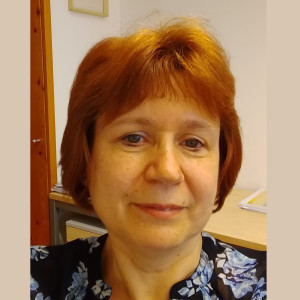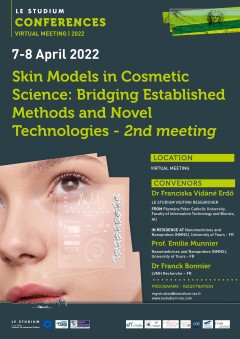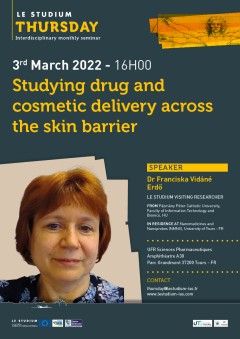Dr Franciska Vidáné Erdő

From
Pázmány Péter Catholic University, Faculty of Information Technology and Bionics, HU
In residence at
Nanomedicines and Nanoprobes (NMNS), University of Tours - FR
Host scientist
Dr Franck Bonnier
BIOGRAPHY
Franciska Erdő obtained her PhD from pharmacology at the Institute for Drug Research, Budapest and Semmelweis University, Faculty of Pharmacy, Budapest, Hungary. Later she worked for different biomedical research institutes (BIOREX Ltd, Veszprém, IVAX Drug Research Institute, Budapest) and joined the research group of Max Planck Institute for Neurological Research, Cologne, Germany and Charité University, Berlin, Germany. The main research interest of her was the investigation and experimental modelling of the pathophysiology of stroke, and development therapeutic strategies against stroke. Next she joined Sanofi-Aventis –Chinoin and SOLVO Biotechnology. Since November 2014 Franciska Erdő has been working for Pázmány Péter Chatholic University, Faculty of Information Technology and Bionics, Budapest. Her expertise is on the physiological barriers and drug delivery accross the barriers. Currently she is involved in skin analysis and RAMAN spectroscopy at University of Tours, France.
PROJECT
Knowledge transfer on Raman spectroscopy and skin-on-a-chip technology to study transdermal drug delivery
The transcutaneous route of drug administration provides huge benefits for the patients for confort (non-invasive) and efficacy (bypassing liver function, continuous and consistent drug release and absorption). It is important to develop proper drug formulations for various indications (pain, inflammation, central nervous system disorders, humoral therapies). During the last years the topical drug delivery techniques showed rapid development. Bioanalytical protocols play a key role in the investigation and optimization processes. Critical parameters of drug permeation such as bioavailabilty and pharmacokinetics will be studied in this grant. In vitro testing is a pivotal step in the early stages of development of new formulas with high demands from the R&D and industry sectors for innovations.
Pázmány Péter Catholic University and University of Tours will work conjointly to address 2 key aspects:
1. In vitro Skin models: Commonly reconstructed skin from tissue culture or excised skin from plastic surgery are used for permeation studies. It is expected that in vitro models accurately mirror in vivo skin barrier function, hence deliver similar permeation to drugs to quickly identify and screen the most promising formulations and drugs. Presently, an innovative low-cost microfluidic technology will be developed: skin-on-a-chip.
2. Analytical protocols: A multi-methodological analytical protocol coupling chromatography, Confocal Raman imaging and ultrasounds imaging will be developed to validate the skin-on-a-chip technology for skin permeation studies. Raman spectroscopy provides non-destructive and label free molecular characterisation of samples enabling to a) monitor drug diffusion in the skin to provide penetration profiles at micrometer scale and b) to construct biochemical maps of skin constituent distribution to study lipid and proteinorganisation and conformation. The permeation of drugs can be correlated to the skin barrier physiological state for a better understanding of molecular interactions between the skin and topical formula.
Publications
Final reports
Several ex vivo and in vitro skin models are available in the toolbox of dermatological and cosmetic research. Some of them are widely used in drug penetration testing. The excised skins show higher variability, while the in vitro skins provide more reproducible data. The aim of the current study was to compare the chemical composition of different skin models (excised rat skin, human skin and human reconstructed epidermis) by measurement of ceramides, cholesterol, lactate, urea, protein and water at different dephts of the tissues. The second goal was to compile a testing system which includes a skin-on-a-chip diffusion setup and a confocal Raman spectroscopy for testing drug diffusion across the skin barrier and accumulation in the tissue models. A hydrophylic drug caffeine and the P-glycoprotein substrate quinidine were used in the study as a topical cream formulation. The results indicate that although the transdermal diffusion of quinidine is lower, the skin accumulation was similar for the two drugs. The different skin models allowed comparable permeability for both compounds, but chemical composition differed. The human skin was abundant in ceramides and cholesterol, while the reconstructed skin contained less water and more urea and protein. Based on these results it can be concluded that skin-chip and confocal Raman microspectroscopy are suitable for monitoring drug penetration and distribution in different skin layers during and at the end of exposure. Furthermore, the human skin obtained from obese patients is not the most relevant model for skin absorption testing in pharmaceutical research.


